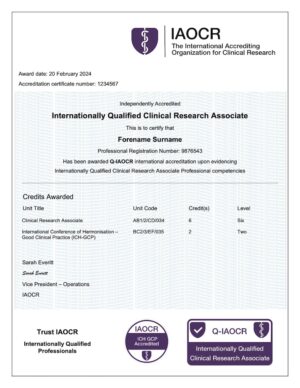Entering the clinical research industry can be challenging and there is no typical pathway to becoming a Clinical Research Associate (CRA). However, with perseverance and dedication, it provides an interesting and rewarding career.
Here are six areas that aspiring and new CRAs should develop to set them on their journey to success.
Relevant Educational Background
Most CRAs hold at least a bachelor’s degree in life sciences, healthcare, or a related field. Common degrees include:
- Biology: Provides a solid foundation in biological sciences.
- Nursing: Offers a practical understanding of healthcare practices and patient care.
- Biomedical Science: Covers a broad spectrum of biomedical knowledge.
Some universities and colleges also offer specialized programs in clinical research.
Gaining Relevant Experience
Many employers require a minimum of two years’ clinical research experience. If you already work in a related field, such as nursing, you may be able to transition relatively easily. However, if you are leaving university or coming from an unrelated profession you may need to consider gaining experience in another way e.g. through volunteer positions and internships. Some employers also offer entry-level CRA roles or opportunities to enter the workforce as a Clinical Trials Assistant (CTA). These opportunities help new CRAs understand their day-to-day responsibilities, which include:
- Preparation and maintenance of clinical trial documentation
- Site visits to conduct compliance monitoring
- Data management and data entry support
Acquiring Key Skills and Knowledge
To excel as a CRA, it is critical you acquire and pursue specialist skills and knowledge such as:
- Understanding regulatory requirements: familiarity with Good Clinical Practice (GCP) guidelines and international standards
- Knowledge of clinical trial phases: Understanding the different phases of clinical trials and the objectives of each phase
- Data management skills: Proficiency in using clinical trial management systems (CTMS) and electronic data capture (EDC) systems
Pursuing Entry Level Accreditation
Professional accreditation or certification demonstrates a commitment to the field and validates the knowledge of entry-level clinical research professionals.
Preparation typically involves studying relevant guidelines, taking preparatory courses, and passing a test or exam (depending on the level of rigor employed by the awarding organization). Industry-ratified Foundation Level Core Global Standards for Clinical Research Professionals can be found on the IAOCR website.
Gaining certification or accreditation through a recognized and respected organization not only enhances knowledge but also demonstrates a personal commitment to working to professional standards in clinical research.
Gaining Advanced Training and Continuing Education
CRAs shouldstay current with advancements and trends in the industry::
- Workshops and seminars: Attend industry conferences, workshops, and seminars and learn about the latest developments in clinical research.
- Courses: Enroll in training courses – either online or in person – from specialized clinical research training providers to gain additional knowledge.
- Advanced degrees: pursuing an advanced degree such as a Master’s in Clinical Research or Public Health to enhance their qualifications and career prospects.
- Secondments and shadowing Opportunities: CRAs wishing to advance their clinical research career further should consider broadening their experience – not just in terms of seniority, but also by experiencing other roles in their organization.
Building a Professional Network
Networking is a crucial aspect of career development.
- Joining Professional Membership Organizations: Organizations like ACRP (USA), ARCS (Australia), CRAC (Canada), SOCRA (USA), NZCR (New Zealand), The Institute for Clinical Research (UK) offer networking events, workshops, and conferences.
- Participating in Online Communities: Engaging in online forums, LinkedIn groups, and webinars dedicated to clinical research can provide insights, support, and opportunities for professional growth.









